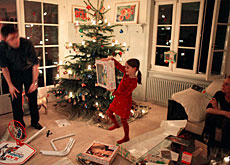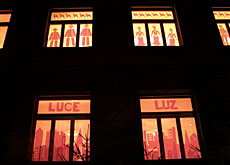Families value a festive Christmas atmosphere

Christmas in Switzerland is an important family ritual and is not considered a time of tension and consumerism, according to a three-year study at Bern University.
Roland Hauri, of the faculty of theology, told swissinfo that secular trends have left a mark on society but families say it is important to create a festive atmosphere at home.
The study looked at how families with small children celebrate Christmas. It is part of extended research into family rituals and how religiosity is transmitted.
The research team of Hauri and Maurice Baumann found that Christmas traditions within families hardly change over generations. They describe it as “small variations on an old theme”.
swissinfo: What is a typical Swiss family Christmas?
Roland Hauri: In very general terms a Swiss family normally decorates a Christmas tree, gives presents and has a meal together.
Most families celebrate on the evening of December 24, but it’s not uncommon for a family to celebrate twice or more over the following days – with grandparents, uncles and aunts for instance.
We know of children in patchwork families who celebrate Christmas up to four or five times.
swissinfo: What other important elements are there in a Swiss Christmas?
R.H.: Many families also sing carols and decorate their homes for the occasion. Often people listen to music or the Nativity story and children recite verses. It has become a tradition in some families to watch television together.
We expected to hear about the huge variety of ways of celebrating Christmas, but what’s more surprising was to learn that almost all respondents mentioned the three main elements.
swissinfo: How has an increasingly secular Christmas influenced the way the Swiss mark the festival?
R.H.: Many people said Christmas was not primarily a religious festival but it was important to create a festive atmosphere.
Unsurprisingly, about 50 per cent of parents said they went to church over Christmas but some families point out that it has simply become too difficult to organise.
Religion is not necessarily seen to be linked to the church. An individual, private approach to religion has developed instead.
swissinfo: How important is the Christmas ritual for family life?
R.H.: Compared with other family rituals we looked into, Christmas is one of the few festivals involving the extended family such as grandparents and brothers or sisters of the parents.
Children say the two most important days are birthdays and Christmas. For their part, adults consider Christmas as very much a family occasion. Bringing the family together is important to them. Material things are only of secondary importance, they said.
One woman we interviewed put it like this: Christmas is a chance to look at how things are within the family. It could be that family members have died or are absent because they want to stay away, or maybe there are new members, such as young children and new partners.
swissinfo: Did your research confirm the view that the festive season is also a time of stress for families, because of more time spent together?
R.H.: There was hardly any indication that Christmas was a time of tension in families. This is probably because families pull together for the sake of the children. They want it to be a time of harmony.
People did mention tensions in the run-up to the Christmas evening celebrations, mainly about who to invite or about when to visit a member of the extended family.
Some grandparents also said they didn’t like the way their grandchildren were being brought up and how they behaved. But no one thinks Christmas is the right moment to have a big discussion about that.
swissinfo-interview: Urs Geiser
More than 1,300 families in the German-speaking part of Switzerland answered a questionnaire.
The researchers also made extended personal interviews with 13 families – grandparents, parents and a nine-year-old child – from the Bern region.
The study is part of a research programme supported by the National Science Foundation into rituals and ritualisations in families, such as the daily bedtime routines and baptism.
The three-year project officially runs until the end of 2006. A final report will be compiled by spring 2007. Detailed publications are planned for a later date.

In compliance with the JTI standards
More: SWI swissinfo.ch certified by the Journalism Trust Initiative










You can find an overview of ongoing debates with our journalists here . Please join us!
If you want to start a conversation about a topic raised in this article or want to report factual errors, email us at english@swissinfo.ch.